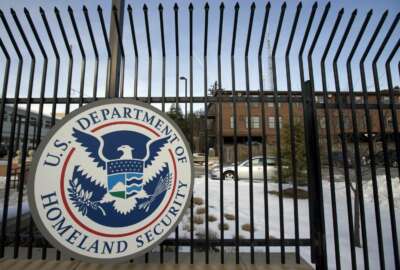
Congressman worried TSA may lose workers because of vaccine mandate
In today's Federal Newscast, one House Republican is worried the Transportation Security Administration will lose a good portion of its workforce over the Biden...
To listen to the Federal Newscast on your phone or mobile device, subscribe in PodcastOne or Apple Podcasts. The best listening experience on desktop can be found using Chrome, Firefox or Safari.
- Homeland Security Secretary Alejandro Mayorkas is teleworking for the time being. The department said he tested positive for COVID-19 yesterday. DHS officials said his only symptoms are mild congestion, and that contact tracing is underway. The diagnosis forced the cancellation of a trip to Colombia. Mayorkas was set to meet there later this week alongside Secretary of State Antony Blinken for multilateral talks on emigration from Venezuela and Haiti. (Federal News Network)
- One House Republican is worried the Transportation Security Administration will lose a good portion of its workforce over the Biden administration’s vaccine mandate. Rep. Carlos Gimenez (R-Fla.) said he’s worried about the mandate’s impact on the TSA workforce near the holiday travel season. CNN recently reported 60% of the TSA workforce is fully vaccinated. The Biden administration said all federal employees must be fully vaccinated by November 22. Gimenez wants to know how TSA will enforce the mandate on employees who refuse to comply, and how the agency is planning for potential staffing shortages.
- The Cybersecurity and Infrastructure Security Agency is in line for a funding boost. Democrats on the Senate Appropriations Committee released a 2022 homeland security funding bill with $2.6 billion for CISA, a $600 million increase above the agency’s current annual budget. The bill includes additional money for federal network security upgrades, voluntary threat detection programs, and the agency’s new Joint Cyber Defense Collaborative. But lawmakers also knock CISA for not giving the committee adequate briefings on the agency’s infrastructure security mission. The bill directs CISA to provide Congress with more information going forward.
- The Department of Homeland Security has distributed $180 million over the past year to nonprofits considered to be at a high risk of terrorist attack. Most were houses of worship. The money is intended to help organizations increase their security measures. Homeland Security Secretary Alejandro Mayorkas said FEMA has also made $77 million in grants to help local communities detect and defend against domestic violent extremist threats.
- Federal employees used just over half of the funds Congress approved for a special emergency paid leave program. Employees used over $330 million in emergency leave to recover from COVID-19, care for sick family members or get the vaccine. It was part of a $570 million fund Congress approved through the American Rescue Plan earlier this year. The program ended at the end of September. Federal employees can no longer request leave through that program. The Office of Personnel Management is still reimbursing agencies for leave taken earlier during the year.
- Once again, Senate appropriators are showing their true colors when it comes to IT modernization. The Technology Modernization Fund would receive no new funding in fiscal 2022 under the Senate’s version of the Financial Services and General Government appropriations bill. Senate appropriators didn’t say why they zeroed out the fund, only pointing to the $1 billion the TMF received as part of the American Rescue Plan Act in March. The White House requested $500 million. The House provided $50 million in its version of the bill. The Senate appropriators, however, did approve other IT modernization funding, $59 million for the Federal Citizen Services Fund at the General Services Administration and $10 million for the IT Oversight and Reform Fund at the Office of Management and Budget.
- Agency and vendor users told the General Services Administration what was missing from the SAM.gov portal and GSA listened. SAM.gov now includes four new features fixing common complaints about the portal, which GSA integrated several contracting systems into in May. One of the improvements GSA said it made is accelerating the ability to search CAGE codes. Another made it easier to request access to documents that are behind a firewall. And a third makes it easier for agency buyers to see For-Official-Use-Only data or other sensitive documents without having to hold a specific acquisition role.
- The Equal Employment Opportunity Commission has a new dashboard to track complaints and other key data from federal employees and agencies. EEOC said the public can now keep tabs on complaints, investigations, case closures, costs and alternative dispute resolutions in real time. This is the first time the EEOC has developed such a data tool for the federal sector. The agency said it plans to expand these tools and create more visualizations illustrating trends in the federal sector.
- Senate appropriators want to give the Pentagon more money than it asked for. The recently released Senate appropriations bills give the Defense Department about $740 billion in 2022. That’s about $24 billion more than the Biden administration asked for earlier this year. The lawmakers said the increases are to deter threats from China and Russia. A large chunk of the increase goes to buying and building weapons. The extra money would give the Air National Guard 16 new C-130s and hand the Air Force six new F-35s that the White House didn’t request. The Navy would get a destroyer. The senators also proposed increasing the Space Force’s budget by $500 million to about $18 billion in total. (Federal News Network)
- New details on the fire that destroyed the U.S.S. Bonhomme Richard last summer. The Navy’s investigation found a single arsonist started the blaze, but widespread leadership and training failures are what let it get out of control. A report set for official release today found sailors weren’t trained on how to use the ship’s firefighting systems, maintenance reports were falsified, and commanding officers in San Diego didn’t coordinate ahead of time with civilian firefighters. In all, the report found 36 senior officers and sailors were responsible for the loss of the ship — either directly or indirectly. (Federal News Network)
- The Defense Department Inspector General is taking a look into how traumatic brain injuries are handled in the military. The DoD IG announced it will conduct an evaluation on whether the Defense Health Agency and military service medical departments treated TBIs properly. That means that the staff followed proper policies and procedures and provided oversight to ensure service members who sustained TBIs were identified and screened to determine the level of needed care.
Copyright © 2024 Federal News Network. All rights reserved. This website is not intended for users located within the European Economic Area.
Eric White
Eric White is news anchor and Federal Drive producer at Federal News Network.
Follow @FEDERALNEWSCAST
Related Stories
AP Photo/Manuel Balce Ceneta





